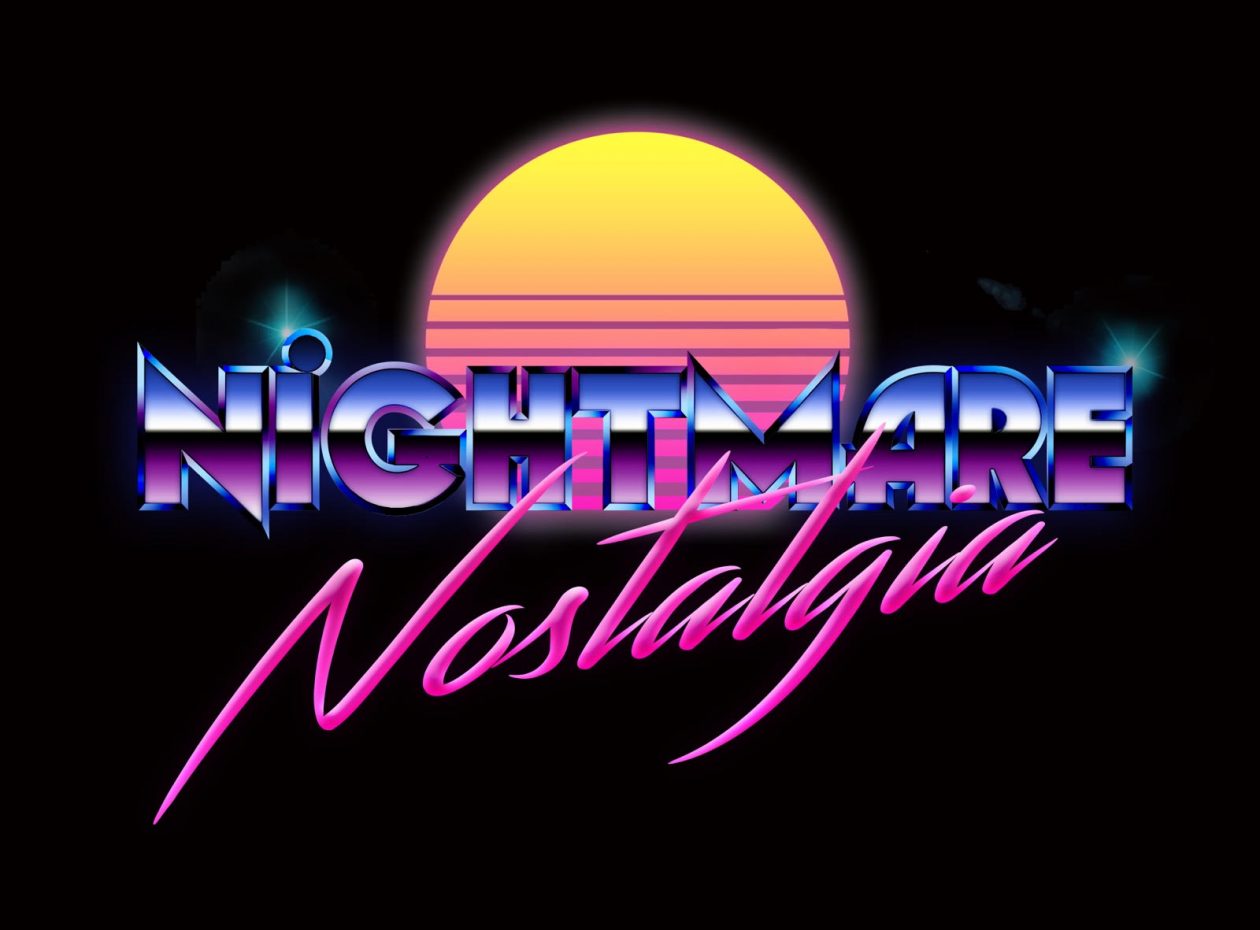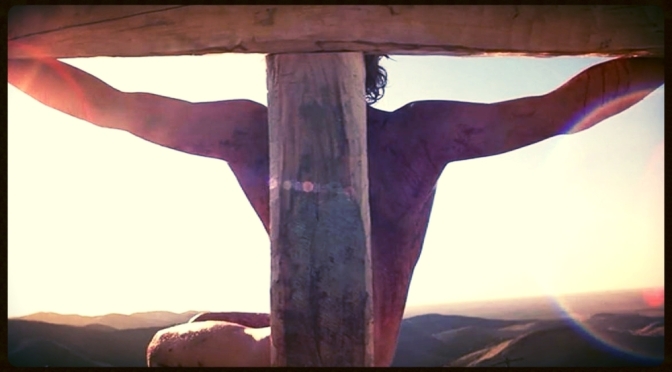“The Dual Substance of Christ… has always been a deep inscrutable mystery to me. … In order to mount to the Cross, the summit of sacrifice, and to God, the summit of immateriality, Christ passed through all the stages which the man who struggles passes through. That is why his suffering is so familiar to us.”
– Nikos Kazantzakis, The Last Temptation of Christ
In honor of the current holiday, I thought I’d like a moment to reflect on one of the most emotionally charged films in my entire library – The Last Temptation of Christ. Filmed by Hollywood legend Martin Scorsese, this movie dared to take on one of the most violently hated novels of the modern era.
Based on the imperial book written by Nikos Kazantzakis, The Last Temptation of Christ tells us the beauty of the Gospel narrative through an entirely new and never-to-be-repeated manner. For that reason, I feel this movie has earned a tremendous cult attraction among thousands while also offending devout practitioners of the evangelical Christian persuasion.
Spiritually stirring, controversial, and heartbreaking; a masterpiece, pure blasphemy, and a faithful reflection of the hear of Christ himself. This single movie can claim all this and so much more.

But rest assured, faithful readers. I may be a theologian, but this will not be a religious discussion. You have no worries of being evangelized to by this. I merely want to praise the daring work of a magnificent film, one that manages to stir the souls of believers and nonbelievers alike. Which, if we’re being honest, is one hell of an accomplishment.
Solemn. Celebratory. Triumphant!
The journey of the Christ, as told in Scorcese’s daring vision, instills a mighty swell of victory once we reach that final heart-pounding moment. It is a victory summed up with a humble smile and three sacred words.
“It is accomplished.”
Three humble words that split across the horizon of the human heart and declare the triumph of the soul across Time. They mark a place in History as deeply spiritual landmarks that have guided millions of souls. Only Scorcese could film such a profound moment, one the viewer’s been building up towards from the very moment the title screen glowed red.
The pace of the film is a march, a defying-all-the-costs parade as Christ and twelve other individuals (who would have their names etched upon the pillars of mankind’s religious history) introduce a new and deeper faith to an ill-prepared world. This was ultimately a death march though, and no matter how many of them might try, there would be absolutely no wavering from that looming imminent finale.
The march began with one single individual who inspires others, and they soon join and follow him. The march leads them to Jerusalem where, for a time, the following grows and becomes a multitude. But all too soon dwindles down to just four – the Christ and his three Apostles – in Gethsemane, and , ultimately, becomes only one – the very same one who started the movement three years previously, who will find himself beaten, abandoned, and alone to face death as he is lifted up, stapled between Heaven and Earth, the essential totem of Grace, a sacrifice for those he loves.
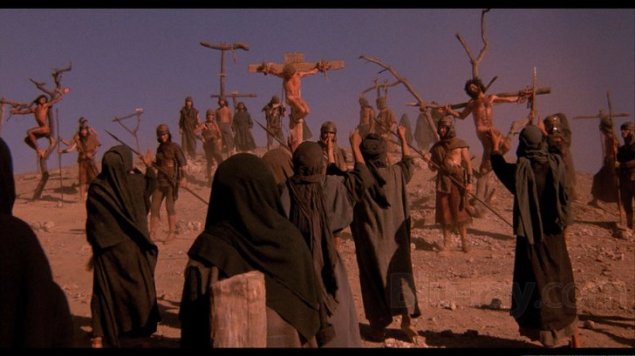
This is only some of the heart of Scorsese’s gripping masterpiece of love, death, and ultimately unyielding life.
In The Beginning
On the Criterion Collection’s release of the film, Scorsese admits he always wanted to make a big-time biblical epic about the life of Jesus of Nazareth. Originally, Scorsese says he was heavily influenced by the larger-than-life works of Cecil B. DeMille. With movies like The Ten Commandments in mind, Scorsese dreamed of matching that level of grandeur someday.
Scorsese also says he wanted it to be a black and white film, something that (I can only speculate now) would have looked like a Gustave Dore work of art come vividly to life. Undoubtedly that would have been breathtaking, but, admittedly, there already was a black and white Jesus epic out there – King of Kings, which is another Criterion Collection release.
Scorsese’s original vision for his future Passion work was later redefined upon seeing Pier Paolo Pasolini’s critically acclaimed The Gospel of St. Matthew. Yup, that means Pasolini, the director of Salo: 120 Days of Sodom, indirectly influenced The Last Temptation of Christ. The work of one fervent visionary sparked the inspiration of another and maybe there was something in the air, but people were just damn creative back then.

Scorsese changed his epic into a powerfully humble character study and focused that study on the Son of God. He didn’t have his core story until Barbara Hershey (Black Swan, Damien, The Entity) gave him a copy of Kazantzakis’ mystical novel and told him he needed to film this story, and (kindly) demanded to play Mary Magdalen, a role she fills dramatically.
The movie was a go. Paramount greenlit the work, but then the Moral Majority of America got wind of the project and threw a fit. The studio feared some very ugly protests and on Thanksgiving Day, 1983, Scorsese was told his Jesus movie was canceled. The film wasn’t even out the door and its protesters were already screaming blasphemy. Scorsese had to cut the budget back if he wanted his passion-project to see the light of day. Universal would later pick up the rights and the movie was a go once again. But people still fought it tooth and nail.
The Great Controversy
So was the controversy of the film justified? Honestly, the subject matter of the movie has always been a subject of controversy – Jesus. In the Gospel record itself, the Son of God is tremendously controversial. In Jesus, we have a Prophet who claims to be Incarnate God and vows to bridge the gulf between humanity’s soul and the divine by using only three nails and two pieces of wood. It is an outrageous claim, one only the God-Man could fulfill. Jesus does just that. Society didn’t know what to make of Him. And, if we’re being real, society still doesn’t.
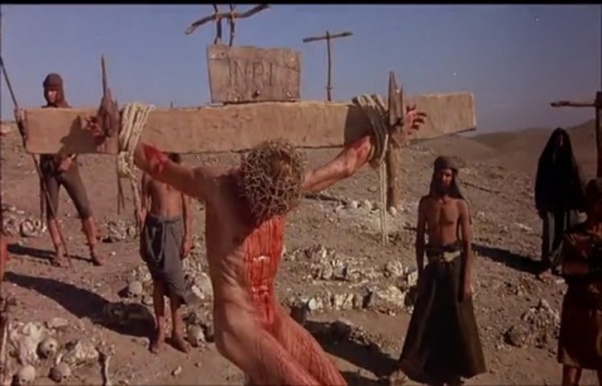
There is a definite idea of who the Messiah needs to be, and if that idea doesn’t match people’s preconceived expectations there is going to be an uproar. And an ugly one at that.
So is the film justifiably controversial?

When you have a Jesus film that opens with Jesus building a cross for another man to be crucified, yeah that is going to ruffles some feathers. Well, Jesus was a carpenter after all, and seeing him build a cross that will hang a man guilty of sedition is somehow amazing. This movie presents us with a Christ who is just doing his job. Before he was called Messiah he was just a regular guy making a living. Therein lies the key genius of this movie.
Christ was like one of us. He felt fear and then proved his strength by facing fear. In this movie, he didn’t want to be Christ, but he couldn’t deny being the Son of the living God. It’s a horror story in a way. Think of it: what if you woke up one day and learned God was your father? You were meant to be the Savior of all mankind, but in order to do that, you had to die as a sacrifice. Oh! And you couldn’t just die, but you had to be crucified, the most horrific and painful death invented out of man’s most heinous imaginations.
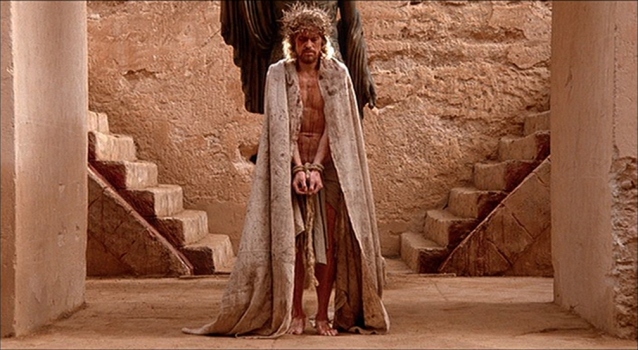
That’s scary! That’s the story behind Last Temptation. A Jesus who is God become Man. God, Eternal Almighty Jehovah, the I AM, become flesh, beautifully and wonderfully human. One of us, just like we are told in St. John 1:14. This film explores the sacred (and often overlooked) humanity of the Savior.
As a man, all he wants is to live a happy life. Marry the woman he loves, drink with friends and laugh in a good company. He wants to build a home and raise a family. He wants to kiss his grandchildren on the head and close his eyes in death knowing he has led a full life – just like a man. That is his greatest Temptation. The amazing drama of the Christ is the fact he is BOTH Man and God, so as a man he wants to live with those he loves, but as God, he must die to redeem their eternal souls.
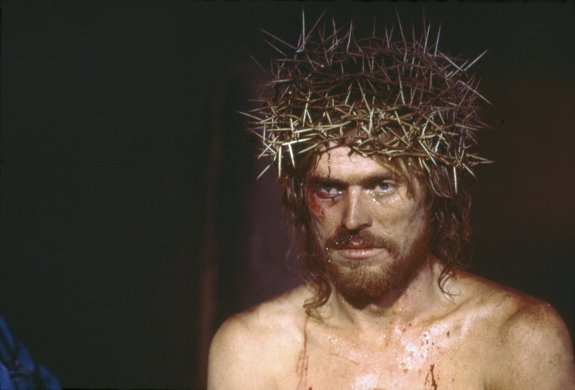
That is the heart of this movie. It is real and raw human emotions springing from the Gospel record. I stress this is not the Gospel, and the filmmakers make that known from the opening title. But this is a celebration of the Gospel’s triumph.
I say that because I grew up in a home that discouraged me from seeing this movie. My parents were missionaries over in Russia, and so I grew up in a very religious home. We did watch religious-based films, but Last Temptation was on the forbidden list. This and The Omen were the top no, nos. Well, shit if those two films weren’t the very ones I had to see though!
I was expecting to see a gross depiction of my Savior, something that would mock up the Christian faith and damage any one’s personal belief upon viewing it. My first reaction though was admiration for how tenderly they depict Jesus. Willem Dafoe steps into the Messiah’s shoes (sandals) and presents us with a very real and very likable Christ. He doesn’t feel far away and distant, but all too real. Someone you could approach without fear of being denied. Before seeing this film, Dafoe isn’t a top choice I’d think of for such a role, but now I can’t imagine anyone else playing this pivotal part.
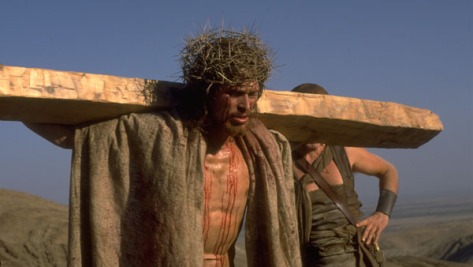
I can’t neglect to mention the other roles mastered in this film. As I said, Dafoe is wonderful for his part, but he is joined by some other titanic performances. Harvey Keitel joins us as Judas Iscariot, the man who will be forever marked as the Traitor of Christ. Unlike any other Jesus movie though, Judas is very close to his Rabbi. At times it feels as if he alone gets what Jesus’ mission has to be. The others are ready to take over all of Jerusalem and (eventually) overthrow their Roman conquerors. Judas, on the other hand, is listening and asking questions.

One of the most powerful moments from the movie transpires between both Jesus and Judas. Jesus knows his fate is at hand, that he must be crucified. He takes Judas aside and tells Judas that he has to be the one who turns the Son of Man over to the soldiers. Judas weeps when he realizes his role in this eternal epic is to ‘betray’ his Master.
In a minor role (but incredibly impactful) David Bowie becomes our Pilate. His interaction with Dafoe’s Jesus was filmed in one day but you’d never know any different. “You’re more dangerous than the Zealots, do you know that?” he asks the condemned Christ with an air of cynicism in his gestures. The confrontation is short but it somehow lingers in our memory. It’s also a scene that then leads us into one of the most emotionally charged Passion scenes depicted on film. Peter Gabriel’s score, something that elevates this movie a hundredfold, simply outdoes itself during this entire painful process. When Jesus is shouldering his cross you’ll feel as though the weight of the whole world is on his shoulders.
Have a listen for yourself.
Finally, the movie is a work of art come to life. Scorsese admits that he used lighting to try and accentuate the visuals as best they could to harken back to some of the finest art of the Reni séance Age.
Final Thoughts
The movie is a masterpiece. It’s a Jesus story unlike any you’ll ever see. Sure, we all feel as if we know the saga of the Messiah, but this film does offer us a story angle we’ve never been introduced to yet. We see the heart of God through the humanity of Christ Jesus. This movie may not be the Gospel account, but it does manage to present us a lot of that self-same heart. Personally, this and Gibson’s own controversial film Passion of the Christ are two common staples to watch each Easter. Both movies offer my inspiration something unique, disturbing, and remarkable.
If you’ve not seen this movie (or if it’s been a while) let yourself taste a little bit of spiritual inspiration and give this one a watch. This has been Manic Exorcism. Have a Happy Easter, a Great Passover, and I’ll be catching you all soon enough. Try not to eat too many tasty chocolate bunnies. That’ll make you sluggish and too easy to hunt, and where’s the fun in that?
